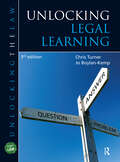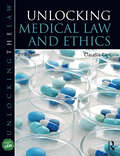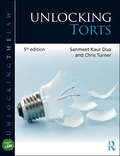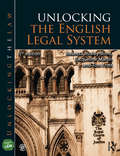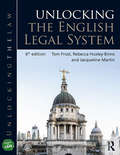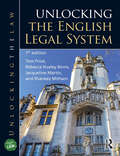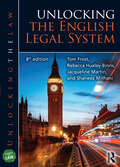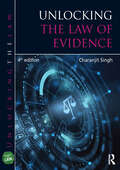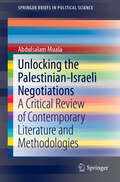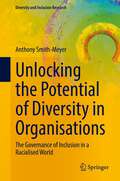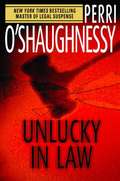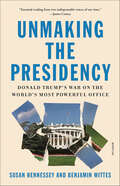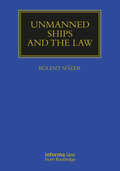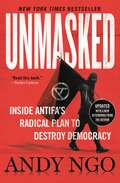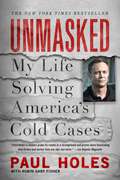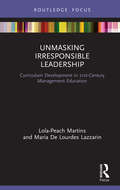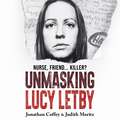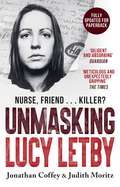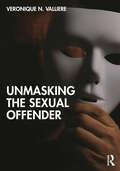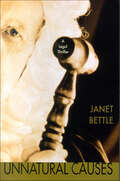- Table View
- List View
Unlocking Legal Learning (Unlocking the Law)
by Chris Turner Jo Boylan-KempUnlocking Legal Learning is an essential textbook for undergraduate students new to legal study. By explaining the different fields of this intricate subject and helping you to develop the skills to engage with it successfully, Unlocking Legal Learning will provide you with an essential foundation for your studies and future career. This third edition is fully up-to-date and incorporates new styles of assessment and learning resources.Support for your studies in Unlocking Legal Learning includes: Detailed information on how to succeed in mooting competitions, coursework, and dissertation assignments Numerous tips on how to take good notes and revise effectively for exams Advice on how to tackle problem-based questions and work well in groups Guidance on how to access and understand legal materials and references in print and online The Unlocking the Law series is designed to make the law accessible and covers all the core subjects required by the Bar Council and the Law Society for entry onto professional qualifications as well as popular option units. The website www.unlockingthelaw.co.uk provides additional resources such as multiple choice questions, key questions and answers and revision mp3s.
Unlocking Medical Law and Ethics 2e (Unlocking the Law)
by Claudia CarrUnlocking Medical Law and Ethics will help you grasp the main concepts of Medical Law with ease. Containing accessible explanations in clear and precise terms that are easy to understand, it provides an excellent foundation for learning and revising. The information is clearly presented in a logical structure and the following features support learning helping you to advance with confidence: Clear learning outcomes at the beginning of each chapter set out the skills and knowledge you will need to get to grips with the subject Key Learning Points throughout each chapter allow you to progressively build and consolidate your understanding End-of-chapter summaries provide a useful check-list for each topic Cases and judgments are highlighted to help you find them and add them to your notes quickly Frequent activities and self-test questions are included so you can put your knowledge into practice Sample essay questions with annotated answers prepare you for assessment Glossary of legal terms clarifies important definitions This second edition has been updated to include discussion of recent changes and developments within the module, such as updated case law, including: Birmingham Children’s NHS Trust v B 2014 EWHC 531; NHS Foundation Trust v A 2014 EWHC 920; A NHS Trust v DE 2013 EWHC 2562; Re P-M (Parental Order: Payments to Surrogacy Agency) 2013 EWHC 2328; R v Catt (Sarah Louise) 2013 EWCA 1187 and Doogan v Greater Glasgow and Clyde Health Board and others 2013 CSIH 36. The books in the Unlocking the Law Series get straight to the point and offer clear and concise coverage of the law, broken-down into bite-size sections with regular recaps to boost your confidence. They provide complete coverage of both core and popular optional law modules, presented in an innovative, visual format and are supported by a website which offers students a host of additional practice opportunities. Series editors: Jacqueline Martin LLM has over ten years’ experience as a practising barrister and has taught law at all levels. Chris Turner LLM is Senior Lecturer in Law at Wolverhampton University and has taught law at all levels.
Unlocking Secrets: My Journey To An Open Heart
by Kathe CrawfordIn this inspiring, soul-searching, and deeply vulnerable memoir, Kathe Crawford lays bare the life of secrets that she kept for many years. When Crawford and her husband, Larry, discovered that Larry was HIV-positive in 1988, they decided to keep the diagnosis a secret from everyone, including their two children. Crawford kept this promise, layering secret upon secret, for almost 30 years, including for more than 20 years after Larry’s death and even as time revealed painful betrayals. Crawford’s journey of unlocking her own secrets, as well as her family’s, was the key to freeing her voice, opening her heart, and finding her true self.
Unlocking Torts (Unlocking the Law)
by Chris TurnerTort law is a core element of every law degree in England and Wales. Unlocking Torts will ensure you grasp the main concepts with ease. This book explains in detailed, yet straightforward, terms: Negligence and negligence related torts including occupiers' liability and employers' liability Land based torts such as trespass, nuisance and Rylands v Fletcher Liability for animals Torts relating to goods Trespass to the person Defamation and other torts relating to reputation Economic torts, breach of a statutory duty, vicarious liability, defences and remedies The fourth edition is fully up to date with the major recent cases including major developments in vicarious liability. It also includes changes after the Defamation Act 2013. The Unlocking the Law series is designed specifically to make the law accessible. Each chapter opens with a list of aims and objectives, contains activities such as quick quizzes and self-test questions, key facts charts to consolidate your knowledge, and diagrams to aid learning. Cases and judgments are prominently displayed, as are primary source quotations. Summaries help check your understanding of each chapter, there is a glossary of legal terminology. New features include problem questions with guidance on answering, as well as essay questions and answer plans, plus cases and materials exercises. All titles in the series follow the same formula and include the same features so students can move easily from one subject to another. The series covers all the core subjects required by the Bar Council and the Law Society for entry onto professional qualifications as well as popular option units. The series website www.unlockingthelaw.co.uk provides free resources such as multiple choice questions, key questions and answers, revision mp3s and cases and materials exercises.
Unlocking Torts (Unlocking the Law)
by Chris Turner Sanmeet Kaur DuaTort law is a core element of every law degree in England and Wales. Unlocking Torts will ensure you grasp the main concepts with ease. This book explains in detailed, yet straightforward, terms: Negligence and negligence related torts including occupiers' liability and employers' liability; Land based torts such as trespass, nuisance and Rylands v Fletcher; Trespass to the person; Defamation and other torts relating to reputation; Economic torts, breach of a statutory duty, vicarious liability, defences and remedies. The fifth edition is fully up to date with key case law including the recent decision of Robinson v Chief Constable of West Yorkshire Police [2018] UKSC and Darnley v Croydon Health Services NHS Trust [2018] UKSC 50 amongst others. The Unlocking the Law series is designed specifically to make the law accessible. Each chapter opens with a list of aims and objectives and contains diagrams to aid learning. Cases and judgments are prominently displayed, as are primary source quotations. Summaries help check your understanding of each chapter, there is a glossary of legal terminology. New features include problem questions with guidance on answering, as well as essay questions and answer plans, plus cases and materials exercises. All titles in the series follow the same formula and include the same features so students can move easily from one subject to another. The series covers all the core subjects required by the Bar Council and the Law Society for entry onto professional qualifications as well as popular option units.
Unlocking the English Legal System
by Jacqueline Martin Rebecca Huxley-Binns Tom FrostUnlocking the English Legal System will help you grasp the main concepts of the legal system in England and Wales with ease. Containing accessible explanations in clear and precise terms that are easy to understand, it provides an excellent foundation for learning and revising. This edition considers recent case law and legislation as well as the outcome of the UK’s referendum on membership of the EU; the decision of Willers v Joyce and its impact on the role of the Privy Council in the system of precedent; the new Combined Family Court; the Legal Education and Training review and changes to the profession; and funding cuts to legal services and legal aid. The Unlocking the Law series is designed specifically to make the law accessible. Each chapter opens with a list of aims and objectives, and contains diagrams to aid learning. Cases and judgments are prominently displayed, as are primary source quotations. Summaries help check your understanding of each chapter, and there is a glossary of legal terminology. New features include problem-based questions with guidance on answering, as well as essay questions and answer plans, plus cases and materials exercises. All titles in the series follow the same formula and include the same features so students can move easily from one subject to another. The series covers all the core subjects required by the Bar Council and the Law Society for entry onto professional qualifications as well as popular option units.
Unlocking the English Legal System (Unlocking the Law)
by Jacqueline Martin Rebecca Huxley-Binns Tom FrostUnlocking the English Legal System will help you grasp the main concepts of the legal system in England and Wales with ease. Containing accessible explanations in clear and precise terms that are easy to understand, it provides an excellent foundation for learning and revising. This edition also contains four new chapters: on European Law and the English Legal System; Legal Reasoning; Alternative Dispute Resolution; and Legal Skills and Examination Preparation. In addition, this edition considers the legal consequences of the UK’s decision to leave the EU, or ‘Brexit’; the proposed Solicitors Qualifying Examination that will be introduced in 2021; the Lammy Review of Black, Asian and Minority Ethnic (BAME) representation in the Criminal Justice System; and the proposals for a new Online Court in the civil justice system. The books in the Unlocking the Law Series get straight to the point and offer clear and concise coverage of the law, broken-down into bite-size sections with regular recaps to boost your confidence. They provide complete coverage of both core and popular optional law modules, presented in an innovative, visual format.
Unlocking the English Legal System (Unlocking the Law)
by Jacqueline Martin Rebecca Huxley-Binns Tom Frost Shaneez MithaniUnlocking the English Legal System will help you grasp the main concepts of the legal system in England and Wales with ease. Containing accessible explanations in clear and precise terms that are easy to understand, it provides an excellent foundation for learning and revising. This new edition offers a brand-new chapter on ‘Ethics and Law’ which details the duties and responsibilities of lawyers and introduces law students to the kinds of ethical dilemmas that they may encounter when they are lawyers. The up-to-date ongoing debates surrounding UK law are discussed, such as the impact Brexit and the coronavirus pandemic have, and continue to have, upon the English Legal System. Further detail on the devolution settlements in Northern Ireland, Scotland, and Wales is provided as well as looking at the question of Scottish independence. Learn how to read cases and statutes, about career skills and interview preparation, and find out further information on how the new Solicitors Qualifying Examination (SQE) will operate and the reaction it’s received from law schools. There is also focus on the impact of racism in the criminal justice system, the new Sentencing Code introduced in 2020, and how technology is changing the way the English Legal System operates. The books in the Unlocking the Law series get straight to the point and offer clear and concise coverage of the law, broken down into bite-size sections with regular recaps to boost your confidence. They provide complete coverage of both core and popular optional law modules, presented in an innovative and visual format.
Unlocking the English Legal System (Unlocking the Law)
by Jacqueline Martin Rebecca Huxley-Binns Tom Frost Shaneez MithaniUnlocking the English Legal System will help you grasp the main concepts of the legal system in England and Wales with ease.Containing accessible explanations in a clear and logical structure, it provides an excellent foundation for learning and revising. Key features include: Clear learning outcomes at the beginning of each chapter set out the skills and knowledge you will need to get to grips with the subject Key Facts summaries throughout each chapter allow you to progressively build and consolidate your understanding End-of-chapter summaries provide a useful checklist for each topic Cases and judgments are highlighted to help you find them and add them to your notes quickly Frequent activities and self-test questions and sample essay questions are included so you can put your knowledge into practice and prepare you for assessment A new ‘Critiquing the Law’ feature is designed to foster essential critical thinking skills The 8th edition has been fully updated throughout to reflect recent developments and changes in the law, including significant updates to the legal implications of the UK’s exit from the European Union and the running of the new Solicitors Qualifying Examination (SQE). The book is also supported by updated digital learning resources. Part of the Unlocking the Law series, it is essential reading for all core modules on the English Legal System.
Unlocking the Law of Evidence (Unlocking the Law)
by Charanjit SinghUnlocking the Law of Evidence will help you grasp the main concepts of the subject with ease. Containing accessible explanations in clear and precise terms that are easy to understand, it provides an excellent foundation for learning and revising Evidence. The information is clearly presented in a logical structure and the following features support learning, helping you to advance with confidence: Clear learning outcomes at the beginning of each chapter set out the skills and knowledge you will need to get to grips with the subject Key Facts summaries throughout each chapter allow you to progressively build and consolidate your understanding End-of-chapter summaries provide a useful check-list for each topic Cases and judgments are highlighted to help you find them and add them to your notes quickly Frequent activities and self-test questions are included so you can put your knowledge into practice Sample essay questions with annotated answers prepare you for assessment Glossary of legal terms clarifies important definitions. This edition has been updated to include the most recent updates in case law and criminal and civil procedure as well as more practical pointers and practice tips to further aid putting knowledge into practice.The books in the UNLOCKING THE LAW Series get straight to the point and offer clear and concise coverage of the law, broken down into bite-size sections with regular recaps to boost your confidence. They provide complete coverage of both core and popular optional law modules, presented in an innovative, visual format.
Unlocking the Palestinian-Israeli Negotiations: A Critical Review of Contemporary Literature and Methodologies (SpringerBriefs in Political Science)
by Abdulsalam MualaThis book offers a critical review of contemporary literature on the Palestinian-Israeli negotiations. Its goal is to highlight the shortcomings of the methods that have been used to date to analyse the underlying causes that have led to a stalemate in the negotiation process. Further, it pursues an approach that considers the multiple factors that can influence the outcomes of the negotiation process. The book represents a substantial academic contribution to the field of conflict resolution by broadening the scope of the analytical framework that is needed to analyse the Palestinian-Israeli negotiations, and bridging the gap between theory and practice. Accordingly, it offers a valuable asset for researchers and students interested in political theory, Middle Eastern studies, international relations, conflict resolution studies, political science, negotiation theory, and contemporary Arab studies and Israeli studies.
Unlocking the Potential of Diversity in Organisations: The Governance of Inclusion in a Racialised World (Diversity and Inclusion Research)
by Anthony Smith-MeyerThis book seeks to explain the nature of discrimination and exclusion and why these are so prevalent in our societies. The continued failure to overcome these obstacles prevent organisations from taking advantage of the significant benefits and returns that come from being inclusive in the face of diversity. It explores the key drivers of non-inclusive behavior and how they can be countered before providing guidance on how organisations can successfully pursue inclusive culture change. With a mix of applied academic theory, practical examples and real-world experiences, the book examines the topic of D&I from four perspectives: (I) Why diversity and inclusion matters. (II) The forces of exclusion and isolation. (III)The imperative conditions of change. (IV)The organisation of the culture transformation process.In doing so, the book meets the diverse needs of those involved in corporate governance, board members, executives, and even consultants who want to understand the intricacies of cultural diversity and inclusion and why so many programmes fail. For academics in organisational behavior, equity, diversity, and inclusion, trained in the social sciences and anthropology, the book offers a guide to the practical application of theory and the implementation of policies that cannot rely on the assumption of stability and consistency. This book is an invitation to anyone who wants to take on the challenge of making a difference and organisational change a reality. Dr. Doyin Atewologun, psychologist, scientist, practitioner and leading expert in the field of promoting inclusion and excellence in organizations, provided valuable consultancy to the author during the creation of this book.
Unlocking the law of Evidence (Unlocking the Law)
by Charanjit SinghUnlocking the Law of Evidence will help you grasp the main concepts of the subject with ease. Containing accessible explanations in clear and precise terms that are easy to understand, it provides an excellent foundation for learning and revising Evidence. The information is clearly presented in a logical structure and the following features support learning, helping you to advance with confidence: Clear learning outcomes at the beginning of each chapter set out the skills and knowledge you will need to get to grips with the subject Key Facts summaries throughout each chapter allow you to progressively build and consolidate your understanding End-of-chapter summaries provide a useful check-list for each topic Cases and judgments are highlighted to help you find them and add them to your notes quickly Frequent activities and self-test questions are included so you can put your knowledge into practice Sample essay questions with annotated answers prepare you for assessment Glossary of legal terms clarifies important definitions. This edition has been updated to include the most recent updates in case law and criminal and civil procedure as well as more practical pointers and practice tips to further aid putting knowledge into practice. The books in the UNLOCKING THE LAW Series get straight to the point and offer clear and concise coverage of the law, broken down into bite-size sections with regular recaps to boost your confidence. They provide complete coverage of both core and popular optional law modules, presented in an innovative, visual format.
Unlucky in Law (Nina Reilly)
by Perri O'ShaughnessyNina Reilly takes on the most dangerous and difficult case of her career in New York Times bestselling author Perri O’Shaughnessy’s latest thriller. An ingenious blend of forensic science, history, and gripping suspense, Unlucky in Law pits the tough but compassionate attorney against the most unbeatable adversary of all: the law. Nina has just received a last-minute call from her old boss and mentor in Monterey County, California, where she is enjoying the breathtaking scenery and spending time with her boyfriend, P.I. Paul van Wagoner. Klaus Pohlmann is in desperate straits and begs Nina to take over a seemingly unwinnable case: A luckless two-time felon named Stefan Wyatt has robbed a grave and made off with the long-buried bones of a Russian émigré. When he is caught and arrested, further devastating evidence found in the grave suggests that Stefan is guilty of a far more deadly crime.A young woman, a classmate of Stefan’s, has been killed, and he is accused of her murder. Now, as a result of California’s Third Strike law, Wyatt is looking at twenty-five years to life whether he’s convicted of grand theft or murder. Either way, he’s in big trouble. With her client’s blood DNA found in the dead woman’s apartment, Nina faces an uphill battle. Suspecting that her hapless client has been set up, Nina brings in a brilliant forensic pathologist who comes up with a startling theory about the case that could rewrite a crucial page of European history. As the evidence mounts against Nina’s client, Paul launches his own investigation into the shadowy past of the two-decades-old skeleton. But long-held secrets nearly get him killed and reveal a more insidious evil at work—and an extraordinary story dating back to tsarist Russia and the Romanov court. As Wyatt edges closer to the unluckiest verdict of his young life, Nina makes an astounding discovery that just might save her client—or expose a killer who could bury them all. Brilliantly imagined and compulsively readable, Unlucky in Law is a beguiling mix of wrenching drama and gripping action. And it is Perri O’Shaughnessy’s most accomplished novel to date.
Unmaking the Presidency: Donald Trump's War on the World's Most Powerful Office
by Benjamin Wittes Susan Hennessey"This is a book for everyone who has developed an unexpected nostalgia for political 'norms' during the Trump years . . . Other books on the Trump White House expertly detail the mayhem inside; this book builds on those works to detail its consequences." —Carlos Lozada (one of twelve books to read "to understand what's going on")"Perhaps the most penetrating book to have been written about Trump in office."—Lawrence Douglas, The Times Literary SupplementThe definitive account of how Donald Trump has wielded the powers of the American presidencyThe extraordinary authority of the U.S. presidency has no parallel in the democratic world. Today that authority resides in the hands of one man, Donald J. Trump. But rarely if ever has the nature of a president clashed more profoundly with the nature of the office. Unmaking the Presidency tells the story of the confrontation between a person and the institution he almost wholly embodies.From the moment of his inauguration, Trump has challenged our deepest expectations of the presidency. But what are those expectations, where did they come from, and how great is the damage? As editors of the “invaluable” (The New York Times) Lawfare website, Susan Hennessey and Benjamin Wittes have attracted a large audience to their hard-hitting and highly informed commentary on the controversies surrounding the Trump administration. In this book, they situate Trump-era scandals and outrages in the deeper context of the presidency itself. How should we understand the oath of office when it is taken by a man who may not know what it means to preserve, protect, and defend something other than himself? What aspects of Trump are radically different from past presidents and what aspects have historical antecedents? When has he simply built on his predecessors’ misdeeds, and when has he invented categories of misrule entirely his own? By setting Trump in the light of history, Hennessey and Wittes provide a crucial and durable account of a presidency like no other.
Unmanned Ships and the Law (Maritime and Transport Law Library)
by BÜLENT SÖZERThis book considers the law relating to the legal aspects of unmanned ships. The author, a doyen of shipping and insurance law from Turkey, delves into the current international legal regime and examines the probable impact of unmanned ships on liability and carriage of goods in a wide-ranging manner. He examines both the legal aspects and technological peculiarities of unmanned ships, as well as contemplating terminological and linguistic questions, to find out whether they can be compatible with the current legal regime applicable to ships in general, while considering alternatives to enable their successful use in the near future. Unmanned Ships and the Law is therefore important not just for legal practitioners and academics in shipping and insurance but all those in related industries of shipbuilding, computer technology and communications.
Unmasked: Inside Antifa's Radical Plan to Destroy Democracy
by Andy NgoIn this #1 national bestseller, a journalist who's been attacked by Antifa writes a deeply researched and reported account of the group's history and tactics. When Andy Ngo was attacked in the streets by Antifa in the summer of 2019, most people assumed it was an isolated incident. But those who'd been following Ngo's reporting in outlets like the New York Post and Quillette knew that the attack was only the latest in a long line of crimes perpetrated by Antifa. In Unmasked, Andy Ngo tells the story of this violent extremist movement from the very beginning. He includes interviews with former followers of the group, people who've been attacked by them, and incorporates stories from his own life. This book contains a trove of documents obtained by the author, published for the first time ever.
Unmasked: My Life Solving America's Cold Cases
by Paul HolesFrom the detective who found the Golden State Killer, a memoir that "grabs its reader in a stranglehold and proves more fascinating than fiction and darker than any noir narrative." (LA Magazine) <p><p>I order another bourbon, neat. This is the drink that will flip the switch. I don’t even know how I got here, to this place, to this point. Something is happening to me lately. I’m drinking too much. My sheets are soaking wet when I wake up from nightmares of decaying corpses. I order another drink and swig it, trying to forget about the latest case I can’t shake. <p><p>Crime solving for me is more complex than the challenge of the hunt, or the process of piecing together a scientific puzzle. The thought of good people suffering drives me, for better or worse, to the point of obsession. People always ask how I am able to detach from the horrors of my work. Part of it is an innate capacity to compartmentalize; the rest is experience and exposure, and I’ve had plenty of both. But I have always taken pride in the fact that I can keep my feelings locked up to get the job done. It’s only been recently that it feels like all that suppressed darkness is beginning to seep out. <p><p>When I look back at my long career, there is a lot I am proud of. I have caught some of the most notorious killers of the twenty-first century and brought justice and closure for their victims and families. I want to tell you about a lifetime solving these cold cases, from Laci Peterson to Jaycee Dugard to the Pittsburg homicides to, yes, my twenty-year-long hunt for the Golden State Killer. <p><p>But a deeper question eats at me as I ask myself, at what cost? I have sacrificed relationships, joy—even fatherhood—because the pursuit of evil always came first. Did I make the right choice? It’s something I grapple with every day. Yet as I stand in the spot where a young girl took her last breath, as I look into the eyes of her family, I know that, for me, there has never been a choice. “I don’t know if I can solve your case,” I whisper. “But I promise I will do my best.”It is a promise I know I can keep. <p> <b>New York Times Bestseller</b>
Unmasking Irresponsible Leadership: Curriculum Development in 21st-Century Management Education (The Principles for Responsible Management Education Series)
by Lola-Peach Martins Maria De LazzarinThis book is unique given its scholarly angle in unmasking irresponsible leadership (IL) by focusing on its meaning. For the first time the concept of irresponsible leadership (IL) is explored in depth, the plethora of terms used in various disciplines is synthesised, and the ped-andragogy of teaching IL as a threshold concept of responsible leadership (RL) is discussed. The methodological approach adopted is creative and sound. Following the call for business schools to do more in developing responsible leadership curriculum, the book is the first of its kind devoted to advocating a radical change in the management curriculum. It draws attention to the essence of developing a shared in-depth understanding of IL by addressing the misconceptions of theories and issues that have contributed to the epidemic corporate scandals worldwide. The authors provide a suite of reflective/reflexive tools for RL learning and development, including the first IL definitional framework useful for understanding IL perspectives. In addition the book is the first to introduce the ILRL board game, which increases the learner’s flow state. Thus, the book highlights how various tools can be useful for engagement, and understanding curricula and ped-andragogical issues vis-à-vis corporate leadership practices and sustainability in turbulent times. Our targeted audience: Academic researchers, final year undergraduates, and postgraduate (including Executive MBA) students and Higher Education Curricula developers/designers. The book provides many benefits, some of which include: Pertinent answers to important questions about responsible leadership and curriculum development; sophistication of qualitative research in management studies; in-depth understanding of irresponsible leadership from a cross-disciplinary perspective; support for leadership employability endeavours and equipping students with in-depth understanding of RL; assisting with developing reflective and reflexive practice; and in terms of ped-andragogy, encouraging innovation and creativity in teaching IL as a threshold concept of RL to reduce unnecessary management curricula bias.
Unmasking Lucy Letby: Nurse, friend . . . killer? – ‘Diligent and absorbing’ Guardian
by Jonathan Coffey Judith MoritzWinner of BEST NEW AUTHOR at THE TRUE CRIME AWARDS 2025Highly commended for BOOK OF THE YEAR at THE TRUE CRIME AWARDS 2025Shortlisted for THE ALCS GOLD DAGGER FOR NON-FICTION at the 2025 CWA DAGGERS'Diligent and absorbing' Gaby Hinsliff, Guardian 'Meticulous and unexpectedly gripping' Janice Turner, The Times'An excellent and open-minded study of the case' Peter Hitchens'An extraordinary piece of work, and one that should be essential reading for anyone thinking of voicing strong opinions on the subject' Tristan Kirk, The London Standard*AS SEEN ON BBC'S PANORAMA*In June 2015 babies started dying unexpectedly on the neonatal unit at the Countess of Chester Hospital. As medics searched desperately for answers, lead consultant Dr Steve Brearey emailed the ward manager to say, 'We still need to talk about Lucy.'Several years have passed since then and Letby is now in jail. And yet the doctor's words continue to hold true. Despite her convictions and an extensive public inquiry, there are more questions now about Letby than ever - and they aren't going away. So who is the real Lucy Letby? What convinced senior medics and the police that she was killing babies? And were they right - or could her convictions be a miscarriage of justice, as some now believe?Drawing on extensive interviews with people who knew and worked with her, as well as unrivalled access to documents and key players in her case, this book traces the story of Letby from primary school to prison, and grapples with the truth about one of the most high-profile murder cases in living memory.
Unmasking Lucy Letby: Nurse, friend . . . killer? – ‘Diligent and absorbing’ Guardian
by Jonathan Coffey Judith MoritzWinner of BEST NEW AUTHOR at THE TRUE CRIME AWARDS 2025Highly commended for BOOK OF THE YEAR at THE TRUE CRIME AWARDS 2025Shortlisted for THE ALCS GOLD DAGGER FOR NON-FICTION at the 2025 CWA DAGGERS'Diligent and absorbing' Gaby Hinsliff, Guardian'Meticulous and unexpectedly gripping' Janice Turner, The Times'An excellent and open-minded study of the case' Peter Hitchens'Should become required reading for any hospital manager' Harry Wallop, The Times______________________________The untold story of the killer nurse.Lucy Letby seemed like a totally ordinary young woman: fun-loving and sociable. Those who knew who say she had a happy childhood with devoted parents, and after university she landed her dream job as a nurse looking after sick babies. She even became a poster girl for the hospital where she worked.And yet today, Lucy Letby is officially the most prolific child killer of the modern era. Following one of the longest murder trials in British legal history, she's been convicted of murdering seven babies, and attempting to murder seven others. She is only the fourth British woman ever to receive a whole life prison sentence. Still only in her thirties, Letby will die in prison. But although her journey from obscurity to infamy has made headlines across the world, very little is known about her. Meanwhile, her convictions have attracted unprecedented controversy with a growing number of critics arguing that she may in fact be innocent. So who is the real Lucy Letby? What was she like according to those who knew her best? What happened at the hospital where she worked? And what convinced senior medics and the police that she was killing babies? Despite trying and failing to appeal her convictions, Letby has maintained her innocence and no one ever saw her harming a baby - which is one reason why this case has become so controversial. Could Lucy Letby be the victim of a miscarriage of justice, as her supporters believe, or is she the cruel, calculating killer that the jury found her to be?Drawing on extensive interviews with people who knew and worked with her, as well as unrivalled access to sources and documents, this book traces the story of Lucy Letby from primary school to prison, and grapples with the truth about one of the most high-profile murder cases in living memory.
Unmasking Lucy Letby: Nurse, friend . . . killer? – ‘Diligent and absorbing’ Guardian
by Jonathan Coffey Judith MoritzWinner of BEST NEW AUTHOR at THE TRUE CRIME AWARDS 2025Highly commended for BOOK OF THE YEAR at THE TRUE CRIME AWARDS 2025Shortlisted for THE ALCS GOLD DAGGER FOR NON-FICTION at the 2025 CWA DAGGERS'Diligent and absorbing' Gaby Hinsliff, Guardian'Meticulous and unexpectedly gripping' Janice Turner, The Times'An excellent and open-minded study of the case' Peter Hitchens'Should become required reading for any hospital manager' Harry Wallop, The Times______________________________The untold story of the killer nurse.Lucy Letby seemed like a totally ordinary young woman: fun-loving and sociable. Those who knew who say she had a happy childhood with devoted parents, and after university she landed her dream job as a nurse looking after sick babies. She even became a poster girl for the hospital where she worked.And yet today, Lucy Letby is officially the most prolific child killer of the modern era. Following one of the longest murder trials in British legal history, she's been convicted of murdering seven babies, and attempting to murder seven others. She is only the fourth British woman ever to receive a whole life prison sentence. Still only in her thirties, Letby will die in prison. But although her journey from obscurity to infamy has made headlines across the world, very little is known about her. Meanwhile, her convictions have attracted unprecedented controversy with a growing number of critics arguing that she may in fact be innocent. So who is the real Lucy Letby? What was she like according to those who knew her best? What happened at the hospital where she worked? And what convinced senior medics and the police that she was killing babies? Despite trying and failing to appeal her convictions, Letby has maintained her innocence and no one ever saw her harming a baby - which is one reason why this case has become so controversial. Could Lucy Letby be the victim of a miscarriage of justice, as her supporters believe, or is she the cruel, calculating killer that the jury found her to be?Drawing on extensive interviews with people who knew and worked with her, as well as unrivalled access to sources and documents, this book traces the story of Lucy Letby from primary school to prison, and grapples with the truth about one of the most high-profile murder cases in living memory.
Unmasking the Sexual Offender
by Veronique N. ValliereThis book unmasks the sexual offender by providing clear, comprehensible information about the motivations, techniques, and dynamics of sexual offenders and their behavior. It not only explores the biases and myths that the reader may rely upon to understand deviance but also explains pathways to offending, the distorted thinking and relating that offenders engage in, and the ways offenders manipulate and exploit others. Sexual offenders are surrounded by mythology, fascination, and revulsion. People who commit sexual offenses present difficult and complicated issues interpersonally, as well as in treatment and management; denial, victim-blaming, aggression, and blatant chronic deception are inherent in interactions with them. Unfortunately, the failure to truly understand their motives and techniques helps provide excuses for and further camouflage of their deviance. The first part of the text explores the presumptions commonly adopted about sexual offenders and shows how misinformation supports the inappropriate behavior of the sexual offender. The second section focuses on exposing the sexual offender using straightforward language and tangible examples. A final, third section includes safety and management strategies for dealing with sex offenders for those both inside and outside the realms of law enforcement and offender supervision. This book is intended for anyone interested in learning about sexual offenders. It is useful for both professionals and non-professionals, including students, paralegals, victim advocates, and others involved in the criminal justice system or mental health field.
Unnatural Causes: A Legal Thriller
by Janet BettleGeri Lander is a successful lawyer always ready to passionately defend the underdog. But when Joanna Pascoe comes to her for help in uncovering the truth behind her husband's mysterious death, even Geri believes she does not have much of a case. What has happened to Joanna's husband seems like a tragedy-a senseless, heart-wrenching tragedy. But, as Geri digs a little deeper, she comes up with frightening questions, and no answers: Why should a perfectly healthy man like Dr. Pascoe die after a simple case of food poisoning, and why such a gruesome death? The further Geri delves, the more suspicious the circumstances become, and before long she discovers that Thomas Pascoe has died from something far worse than food poisoning. Dr. Pascoe is the victim of a deadly super-bug-a bacterium resulting from over-use of antibiotics in farm animals. Geri begins to investigate, only to be thwarted at every attempt to discover the truth. The authorities are curiously unwilling to help, more people are dying, and suddenly Geri finds herself in the middle of a dangerous conspiracy. In this terrific first novel, Janet Bettle introduces a feisty heroine and brings a fresh and contemporary voice to the world of legal thrillers.
Unnatural Death: Confessions Of A Medical Examiner
by Michael Baden Judith A. Hennesee* JFK's autopsy failed to disclose crucial evidence. * The deaths of John Belushi and Elvis Presley were far more complex than anyone has let on. * Decisive medical findings in the von Bulow affair were consistently overlooked. These are but three of the shocking revelations in Dr. Michael Baden's first-person, no-holds-barred account of his distinguished career in forensic pathology. In determining the causes of tens of thousands of deaths, from those of presidents and rock stars to victims of serial killings, exotic sex rituals, mass disasters, child abuse and drug abuse, Baden has come to the unavoidable conclusion that the search for scientific truth is often sullied by the pressures of expediency. He produces dramatic evidence to demonstrate that political intrigue, influence peddling, and professional incompetence have created a national crisis in forensic medicine. "A fascinating look into the mechanics of forensics and a disconcerting lesson in the politics of death.
